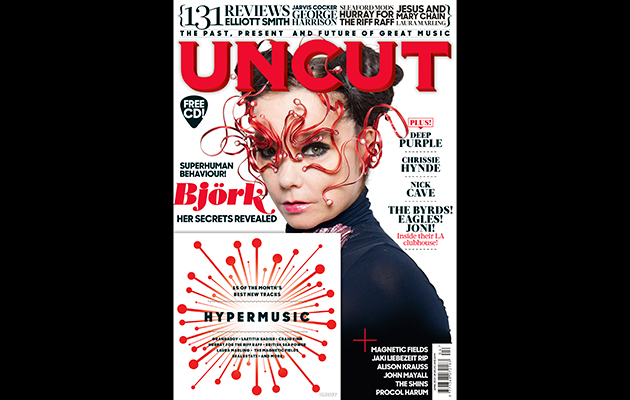There are some musicians who quietly get on with their work, and there are others who can somehow turn the business of making music into a heroic adventure, a physical exploration as much as a sonic one. They can be the source of some great stories and Björk, Uncut’s cover star this month, is no exception (We’re on sale in the UK on Thursday February 16, though subscribers should hopefully see issues a bit before then).
Anohni, for instance, has a good tale about recording Volta with Björk in New York, where the singer suddenly decided the whole operation should decamp to Jamaica for a few weeks. Anohni tells of how Björk went swimming out to sea one night. “I was so nervous about it,” she remembers. “[Björk’s] friend said, ‘Don’t worry, she does this all the time!’ I marvelled at her courage and sense of abandon.” In the studio, Anohni “couldn’t keep up, I felt like a little dog chasing a horse… It was like standing next to a volcano.”
Thirty years after the Sugarcubes’ “Birthday” first presented that astonishing voice and imagination to a worldwide audience, our investigation of Björk’s musical history – a study of her key albums, illuminated by her key collaborators – reveals an artist whose appetites have gained a kind of mythic potency. It inspired me, among other things, to revisit an interview I conducted in 1993, at the beginning of her solo career. In a rehearsal studio in North London, she lamented how her old friends had lost their fearlessness. “People are really wild when they’re teenagers, and then they think either you stay like that, or you become conventional,” she said. “But you have to re-invent yourself every day, you have to re-invent every day what is wild.”
It’s a great manifesto, and one which is implicit in the maverick spirits which proliferate in Uncut every month. This issue, the determinedly independent voices include Chrissie Hynde, whose lateral thinking comes up with a powerful – and very unexpected – figurehead to oppose Donald Trump; Nick Cave, back on stage and re-inventing “The Mercy Seat” for a new world; Jack White, turning his idiosyncratic hand to the actual mechanics of making records; and Manuel Göttsching, a Krautrock original whose impulses remain pioneering, well over 40 years down the line. Plus, there’s Deep Purple, the return of Nick Cave & The Bad Seeds, an excellent piece about The Magnetic Fields, Jaki Liebezeit remembered, an especially strong free CD of new music, an especially great album of the month from Hurray For The Riff Raff, and a long thing, by me, on the deluxe reissue of one of my favourite albums, Elliott Smith’s Either/Or.
“I make it all sound so easy, don’t I?” laughed Björk back in 1993. “It’s not that easy at all. ‘Björk, you should start a religious sect!”



